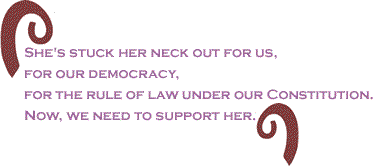
|
|||||||||||||||||||||
 |
|||||||||||||||||||||
 |
|||||||||||||||||||||
 |
|||||||||||||||||||||
 |
|
Congresswoman Cynthia McKinney has introduced articles of impeachment against George Bush, Dick Cheney, and Condoleezza Rice. In doing so, she alone has spoken for the 51 percent of Americans who Newsweek says want Bush impeached. A considerably higher percentage of Americans would, if asked, almost certainly acknowledge that the abuses with which McKinney charges Bush et al. have, in fact, been committed by them and are impeachable offenses. That is to say, there are those who recognize the grounds for impeachment but don't want to see them pursued. There are even those who want impeachment pursued but wish it were not being pursued by McKinney. McKinney charges that Bush, Cheney, and Rumsfeld manipulated intelligence and lied to justify war, and that Bush has engaged in illegal domestic spying. The former charge has been extremely well documented, and the latter proudly confessed to. The former charge was central to the concern of those who included impeachment in the U.S. Constitution. The latter charge is one of openly violating a law that was established in response to President Richard Nixon's impeachable offenses. So, why aren't all impeachment advocates thrilled? Because McKinney's courage and leadership are overpowered, in their minds, by their own fears. They're afraid that impeachment will be painted as radical and that other people less insightful than themselves will, as a result, oppose it. They fail to recognize that silence is more damaging to the cause of justice than are attacks by its opponents, and that other Americans are just as smart (although just as scared) as they are. McKinney has put impeachment where Speaker-Designate Nancy Pelosi said it could not go: on the table. This can only benefit the cause of impeachment.
The media attacks on McKinney have begun, and rather than joining in them by condemning her for bravely doing what we know needed to be done, we should be defending her with a barrage of letters to editors and phone calls to radio shows. And we should be urging every member of Congress to join her. Associated Press reporter Ben Evans has published a vicious attack on McKinney in which he alleges that
But in which Evans does not comment on public support for the action or the merits of the case. Instead, he suggests that McKinney has launched an attack directed as much at Pelosi as at Bush. But McKinney said nothing about Pelosi and accused Bush of the highest possible crime. Where are Evans' priorities? Evans does not even say what the charges against Bush are. Rather he launches into an attack on McKinney:
And she said nothing of the legitimacy of his election. McKinney was tried and convicted in the press, and was never indicted. Evans later writes:
How has she done that? By acting on behalf of a majority of Americans using a tool that appears centrally and in six places in our Constitution, a tool that has been vital to U.S. and British democracy for 700 years? Evans isn't done yet:
McKinney hosted a day-long briefing that included academics, authors, and former government and intelligence professionals, some of whom questioned the work of the 9-11 Commission, but none of whom presented theories.
Evans keeps going:
The Tupac Amaru Shakur Records Act did not establish a permanent collection of his music at the Archives or create an investigation, but required the release of all government records relating to his life and death at federal, state, and local levels. Evans persists:
A Grand Jury heard these charges and dismissed them. Evans says as much, but twists this fact with the words that follow:
Now, what does any of that have to do with whether our President used fraud to take us into the current war? Nothing, of course. But in the U.S. corporate media, it is only those who supported the war who have the right to speak against it. If you opposed the war from the start, if you saw through the lies while it still mattered, you are disqualified now from commenting further.
Matthew Daly, another Associated Press reporter, wrote an article on Friday that contrasted with the one by Evans. The headline was "Smith says Iraq war may be 'criminal'". And the article began:
Of course, it is. But Smith called it such in the vaguest of terms. McKinney laid out the evidence in an Article of Impeachment. Look at the treatment the AP gave Smith:
Why was his speech "major"? Because he supported a criminal war on the basis of evidence that millions of us and half the Democrats in Congress saw through at the time. The article went on to quote Smith on his reasons for charging that the war is criminal, but added nothing about his embracing controversy, splitting with the Republican party, or having done anything unpopular in the past:
This treatment continued for seven more paragraphs. Congresswoman McKinney is not only a more intelligent and responsible public servant than Senator Smith, but she is also someone who foresaw the current attacks on her record and forged ahead anyway. She understands her role as public servant to involve serving the public. And, in the long run, she is serving the interests of the Democratic Party, whether everyone in that party grasps the point or not. She's stuck her neck out for us, for our democracy, for the rule of law under our Constitution. Now, we need to support her. Sunday, December 10th, was Human Rights Day, the 58th anniversary of the adoption of the Universal Declaration of Human Rights, a document that lays out, in 30 short articles, rights that every human should have protected. Eleven out of the 30 have clearly been violated in the United States by President Bush and his administration, rights including:
David Swanson, co-founder of the AfterDowningStreet.org coalition, works for ImpeachPAC.org, which is funding pro-impeachment candidates. Each one has committed to making the introduction of articles of impeachment his or her first act in office. Swanson also works for MyDem.org, which is giving people tools to help make sure their votes are counted. A former newspaper reporter, he was the press secretary for Dennis Kucinich's 2004 presidential campaign. Copyright 2006 David Swanson |
|
| Home | |
| December 14, 2006 Issue 210 |
||||||||||||||
|
||||||||||||||
| Printer Friendly Version in resizeable plain text format | ||||||||||||||
 |
||||||||||||||
|
||||||||||||||
 |
||||||||||||||
 |
||||||||||||||
 |
||||||||||||||
 |
||||||||||||||
| |
||||||||||||||
| |
||||||||||||||






























